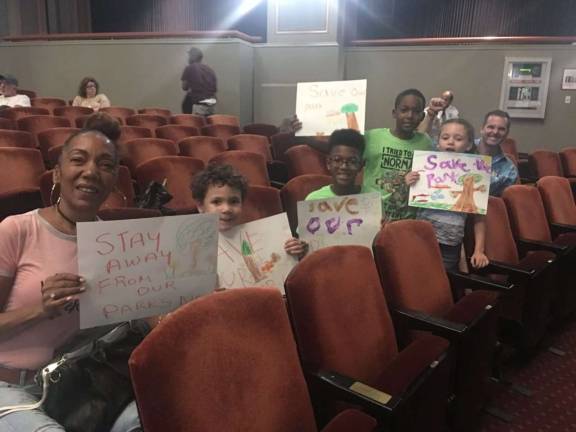A new anti-gilder center candidate

Latest AMNH public hearing launches another campaign for City Council
By Madeleine Thompson
The booing started even before Ann Siegel, senior vice president for operations and capital programs at the American Museum of Natural History, began speaking. This was not entirely surprising, given the vitriol that the museum’s planned Gilder Center for Science, Education and Innovation has inspired over the past year. Siegel was not the last to be booed or interrupted last Thursday during the public hearing session for the draft Environmental Impact Statement (DEIS), which drew a crowd of more than 100 people to the museum’s LeFrak Theater.
Held by the city’s Department of Parks and Recreation, the hearing provided a chance for the Upper West Side community to comment on the DEIS, which was released last month. Much of what was said surely came as no surprise to either the department or the museum, which has faced vehement opposition to its expansion since plans for the Gilder Center were announced in late 2015. “The [DEIS] suggests that 750,000 more people will come every year, and yet the suggestion is there will be no substantial adverse impact on the environment in this community,” said Susan Nial, a Landmark West board member. “That ... is ludicrous.” Lydia Thomas, a co-founder of Defenders of Theodore Roosevelt Park, said the DEIS seemed to “resolve every issue in the museum’s favor.” She went on to list her group’s concerns, including shadows cast by the building, the lobby’s double use as a space for fundraising parties and sufficient management of the park’s roped-off green spaces should they be opened to the public, among other things.
Bill Raudenbush, vice president of Community United to Protect Theodore Roosevelt Park, provided the only true surprise of the evening. Raudenbush announced during his allotted three-minute speaking time, after railing against the Gilder Center and the alleged lack of air conditioning in the theater (museum officials said it was on throughout the hearing), that he would be running for City Council to fight the Gilder Center. “We deserve responsible city government that clearly articulates not just in our benefits, but also the long-term impact of moving our public assets into private hands,” he said. “This is an issue that goes much beyond the Museum of Natural History and the utter failure to our elected officials to do give anything but a glad-handed high-five as they march bulldozers into our precious park.”
Raudenbush will be the second City Council candidate running on a platform of opposition to the Gilder Center. Cary Goodman, a fellow Upper West Sider, announced his own campaign earlier this year and has raised just over $10,000, according to the Campaign Finance Board website. At last week’s hearing, Goodman criticized Council Member Helen Rosenthal and Mayor Bill de Blasio for supporting the museum. “From the beginning, we have said this is a toxic plan,” Goodman said, warning against the release of dangerous chemicals from the construction site. The DEIS states that the project “would have no known risks with respect to hazardous materials that cannot be controlled” by employing certain methods.
Asked how his campaign will differ from Goodman’s, Raudenbush said his opponent was “laser-focused” on the issue of park land, while he is also interested in issues like President Donald Trump’s proposed budget cuts. “I see [de Blasio’s budget] come out that has nothing to do with Trump cuts ... and that’s so dangerous,” Raudenbush said after the hearing. “What if these cuts come and we have not enough savings?” He went on to say that he sees city politics as somewhat of a broken process, with elected officials “not being honest” about their interests. Raudenbush said he hopes to change that, and stopping the Gilder Center would be an added bonus.
Madeleine Thompson can be reached at newsreporter@strausnews.com